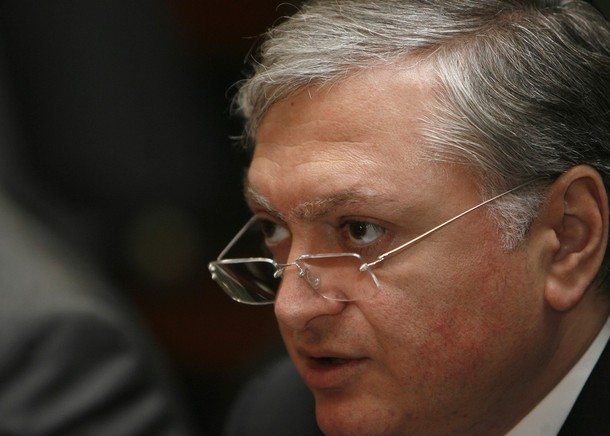NICOSIA, Cyprus (A.W.)— Armenian Foreign Minister Edward Nalbandian addressed the Artsakh conflict and criticized Azerbaijan in his statement at the 127th Session of the Committee of the Ministers of the Council of Europe, which took place on May 19.
At the meeting held in Cyprus, the Minister responded the Council of Europe’s Secretary General, who claimed that democracies are less likely to go to war.
“Obviously, authoritarian regimes do not face this dilemma,” read a part of Nalbandian’s statement referring to Azerbaijan. “Such a case was witnessed during new large-scale offensive in April 2016, when Azerbaijan committed gross violations of international humanitarian and human rights law against the people of Nagorno-Karabagh (Artsakh).”
Nalbandian added that two summits were convened following last April’s Azerbaijani aggression, where agreements were reached aimed at implementing the peace process. However, Baku has refused to abide by these agreements despite the their importance that has been emphasized many times including most recently at a trilateral meeting of the Foreign Ministers of Russia, Armenia, and Azerbaijan, which took place on April 28, said Nalbandian.
“Moreover, Baku continues the gross violations of the trilateral cease-fire agreements in defiance to the consistent calls of the [Organization for Security and Cooperation in Europe – OSCE] Co-Chair countries and the international community,” continued the statement that was published on the foreign ministry’s website. “We value the recent initiatives that call on the equal application of the pan-European human rights instruments to the whole continent without distinction, including in the conflict zones.”
Nalbandian’s statement at the Council of Europe’s ministerial committee session comes as another week of escalated tensions at the Artsakh-Azerbaijan Line of Contact (LoC) concluded. Earlier this week, both Azerbaijani and Armenian sources claimed to have destroyed enemy military equipment, with the Armenian side refuting an attack initiated by Azerbaijani forces.
On May 18, the Co-Chairs of the OSCE Minsk Group, Ambassadors Igor Popov of Russia, Stephane Visconti of France, and Richard Hoagland of the United States of America, issued a statement condemning both sides for violating the ceasefire and called on both sides to take the necessary measures to prevent further escalation.
“According to information collected from multiple reliable sources, on May 15, Azerbaijani Armed Forces fired a missile across the Line of Contact, striking military equipment,” read part of the statement. “On the evening of May 16 and continuing into 17 May, Armenian Armed Forces retaliated with mortar fire of various calibers.”
“These actions by both sides represent significant violations of the ceasefire and are cause for alarm,” it added.
The Armenian Foreign Minister addressed the OSCE’s statement in a meeting with the Council of Europe’s Secretary General Thorbjorn Jaglan in Cyrpus.
During the meeting, in addition to a number of issues were discussed regarding Armenia’s involvement in the Council of Europe, Nalbandian briefed the Secretary General on Armenia’s efforts in implementing the peace process put forth by the OSCE.
He also stressed that Armenia calls on the OSCE to blame the side responsible in their statements unlike their most recent one.
“By rejecting the creation of the investigation mechanism, Azerbaijan wants to avoid the responsibility for its periodic violation of the ceasefire, but the non-standard statement issued by the three Co-Chairs yesterday clearly indicates the guilty party,” said Nalbandian.
The Foreign Affairs Ministers from the Council of Europe’s 47 countries participated in the session of committee ministers.
